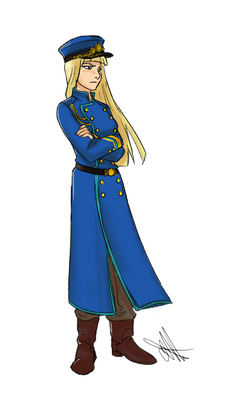Andrea Doria: Difference between revisions
mNo edit summary |
mNo edit summary |
||
| Line 18: | Line 18: | ||
}} | }} | ||
'''Andrea Eufemia Doria''' (1 January 1892 – 7 March 1984) was a head of [[House Davion]] well-known for her tenure as the [[Grand Admiral of the Cacertian Royal Navy|Grand Admiral of the Royal Navy]] from | '''Andrea Eufemia Doria''' (1 January 1892 – 7 March 1984) was a head of [[House Davion]] well-known for her tenure as the [[Grand Admiral of the Cacertian Royal Navy|Grand Admiral of the Royal Navy]] from 1922 until her retirement from active duty in 1970. Her tenure as Grand Admiral was characterized by the [[Cacertian Empire|Cacertian Empire’s]] participation in the [[Siduri War]] and the strategic contributions she made to reforming the [[Cacertian Royal Navy|Royal Navy]] following the [[Divide War]]. | ||
A competent and progressive naval strategist, historians credit Andrea vehemently advocated for a more maneuverable form of warfare and aggressively campaigned to abandon the [[Decisive Battle Doctrine (Cacerta)|Decisive Battle Doctrine]]. There were many detractors of her proposed changes in the CRN, but few challenged her strong-willed personality. After the Siduri War broke out, she often commanded her fleets personally and was the last Grand Admiral to serve in combat before the position was permanently changed to a professional statutory office. | A competent and progressive naval strategist, historians credit Andrea vehemently advocated for a more maneuverable form of warfare and aggressively campaigned to abandon the [[Decisive Battle Doctrine (Cacerta)|Decisive Battle Doctrine]]. There were many detractors of her proposed changes in the CRN, but few challenged her strong-willed personality. After the Siduri War broke out, she often commanded her fleets personally and was the last Grand Admiral to serve in combat before the position was permanently changed to a professional statutory office. | ||
Revision as of 01:58, 29 January 2023
This article is incomplete because it is pending further input from participants, or it is a work-in-progress by one author. Please comment on this article's talk page to share your input, comments and questions. Note: To contribute to this article, you may need to seek help from the author(s) of this page. |
Andrea Doria | |
|---|---|
 Andrea in a naval winter uniform (1933). | |
| Born | 1 January 1892 Fumicino, Lombardo, Cacertian Empire |
| Died | 7 March 1984 (aged 92) Fumicino, Lombardo, Cacerta |
| Allegiance | |
| Service/ | |
| Years of service | 1912–1970 (58 years) |
| Rank | |
| Commands held | Grand Admiral of the Royal Navy Center Fleet HMS Amika Carpio |
| Battles/wars | Divide War Siduri War |
Andrea Eufemia Doria (1 January 1892 – 7 March 1984) was a head of House Davion well-known for her tenure as the Grand Admiral of the Royal Navy from 1922 until her retirement from active duty in 1970. Her tenure as Grand Admiral was characterized by the Cacertian Empire’s participation in the Siduri War and the strategic contributions she made to reforming the Royal Navy following the Divide War.
A competent and progressive naval strategist, historians credit Andrea vehemently advocated for a more maneuverable form of warfare and aggressively campaigned to abandon the Decisive Battle Doctrine. There were many detractors of her proposed changes in the CRN, but few challenged her strong-willed personality. After the Siduri War broke out, she often commanded her fleets personally and was the last Grand Admiral to serve in combat before the position was permanently changed to a professional statutory office.